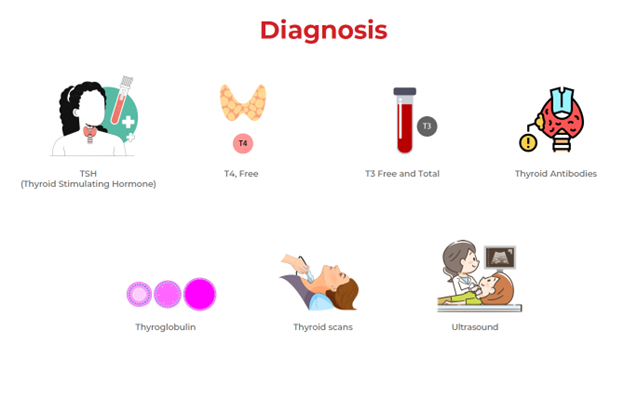Understanding Thyroid Problems – Causes, Symptoms & Treatment
Overview
The thyroid is a small, butterfly-shaped gland at the base of the front of the neck and produces triiodothyronine (T3) and thyroxine (T4) hormones. These hormones affect all aspects of metabolism and also influence the control of vital functions, such as body temperature and heart rate. The thyroid gland also needs adequate amounts of dietary iodine to be able to produce T4 and T3.

Types of Thyroid problems
The main types of thyroid problems are:
Hyperthyroidism
When the thyroid produces too much hormone. It’s also called overactive thyroid.
Hypothyroidism
When the thyroid doesn’t produce enough hormone. It‘s also called underactive thyroid.
Thyroid Cancer
When some of the thyroid cells become cancerous.
Goiter
An unusually enlarged thyroid gland. Usually, the only symptom of a goiter is swelling in the neck. A very large goiter can also cause a tight feeling in the throat, coughing, and problems swallowing or breathing.
Thyroid Nodules
A condition called toxic nodular goiter or multinodular goiter. Thyroid nodules are growths that form on or in the thyroid gland and can cause the thyroid gland to overproduce hormones.
Thyroiditis
An inflammation of the thyroid gland and may be associated with either hypothyroidism or hyperthyroidism. Thyroiditis may be due to an autoimmune disorder (especially Hashimoto’s thyroiditis), an infection, exposure to a chemical that is toxic to the thyroid, or due to an unknown cause (idiopathic).
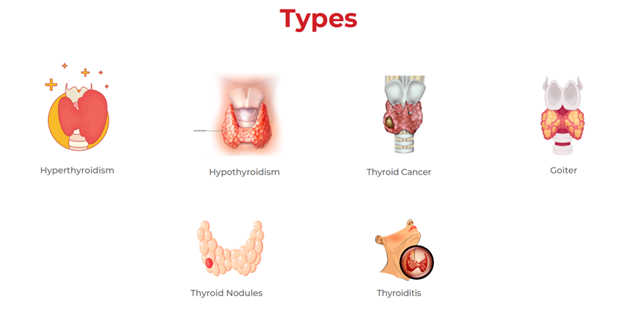
How do thyroid problems affect women?
Women are more likely than men to have thyroid diseases, especially right after pregnancy and after menopause. In women, thyroid diseases can cause:
- Problems with the menstrual period: The thyroid helps control the menstrual cycle. Hyperthyroidism or Hypothyroidism can make periods very light, heavy, or irregular. Thyroid disease can cause periods to stop for several months or longer, a condition called amenorrhea, and can also lead to early menopause (before age 40).
- Problems getting pregnant: When thyroid disease affects the menstrual cycle, it also affects ovulation making it harder to conceive.
- Problems during pregnancy: Thyroid problems during pregnancy can cause health problems for the mother and the baby.
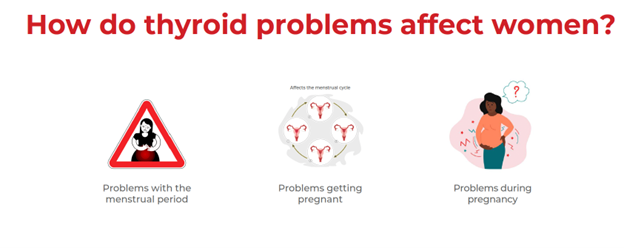
What are the causes of underactive thyroid problem i.e. Hypothyroidism?
The following conditions cause hypothyroidism:
- Hashimoto’s thyroiditis: The most common cause of hypothyroidism. The disease occurs when the body’s immune system mistakenly attacks and slowly destroys the thyroid gland and its ability to produce hormones.
- Postpartum thyroiditis: An inflammation of the thyroid after giving birth, affecting around 10% of women.
- Removal of the thyroid gland: The thyroid may have been surgically removed or chemically destroyed.
- Medications: Few medications, particularly lithium may cause drug-induced hypothyroidism.
- Congenital defects: Hypothyroidism can be present from birth resulting in mental retardation, goiter, and short stature.
- Iodine deficiency: Lack of iodine diminishes the ability of the thyroid gland to make enough thyroid hormone.
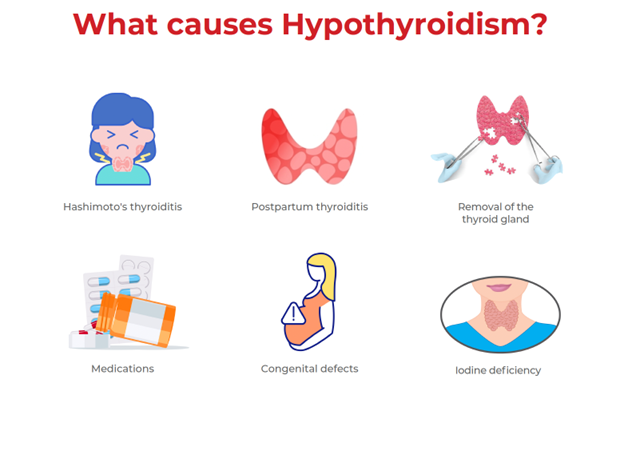
What causes Hyperthyroidism?
The following conditions cause hyperthyroidism:
- Graves’ disease: The most common cause of hyperthyroidism. Graves’ disease is an autoimmune disorder that occurs when the body’s immune system mistakenly attacks the thyroid gland. This can cause the gland to overproduce the hormone responsible for regulating metabolism.
- Thyroid Nodules: A condition called toxic nodular goiter or multinodular goiter. Thyroid nodules are growths that form on or in the thyroid gland and can cause the thyroid gland to overproduce hormones.
- Pituitary adenoma: The tumor of the pituitary gland leads to overstimulation of the thyroid gland.
- Subacute thyroiditis: A temporary inflammatory disorder of the thyroid gland resulting in periods of increased thyroid hormone release due to inflammation.

What are the symptoms of Hypothyroidism?
Common symptoms of Hypothyroidism
- Weight gain
- Fatigue
- Increased sensitivity to cold
- Constipation
- Dry skin
- Puffy face
- Hoarseness
- Muscle weakness
- Muscle aches
- Thinning hair
- Slowed heart rate
- Depression
- Impaired memory
- Enlarged thyroid gland (goiter)
- Irregular menstrual periods
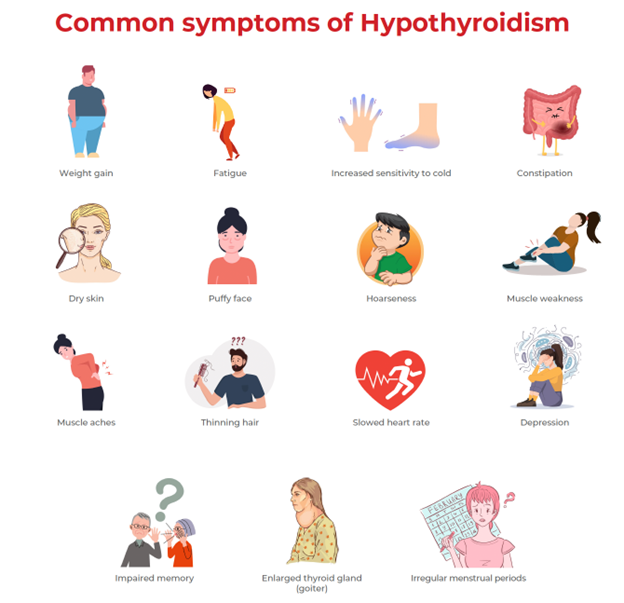
Babies with hypothyroidism may have
- Cold hands and feet
- Constipation
- Extreme sleepiness
- Hoarse cry
- Little or no growth
- Low muscle tone
- Persistent jaundice
- Poor feeding habits
- Puffy face
- Stomach bloating
- Swollen tongue
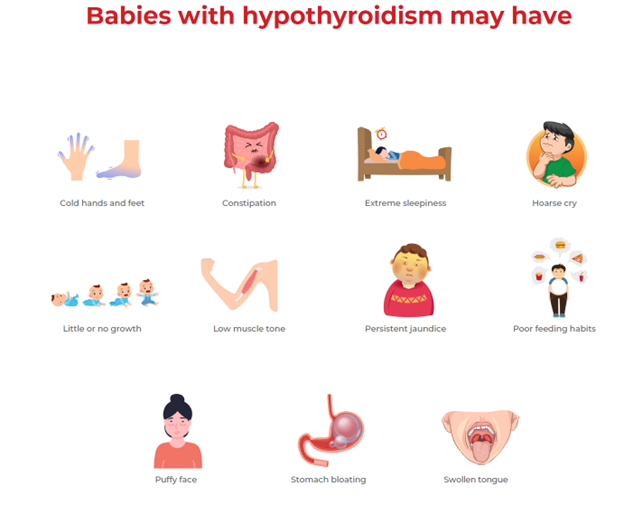
Children and teens have the same signs and symptoms as adults, but they may also experience:
- Poor growth, resulting in short stature
- Delayed development of permanent teeth
- Delayed puberty
- Poor mental development
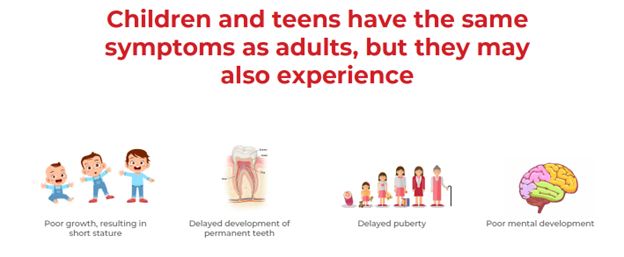
What are the symptoms of Hyperthyroidism?
Common symptoms of Hyperthyroidism
- Nervousness
- Irritability
- Muscle weakness
- Infrequent, scant menstrual periods
- Weight loss
- Trouble sleeping
- Enlarged thyroid gland
- Vision problems
- Heat sensitivity
- Racing heart
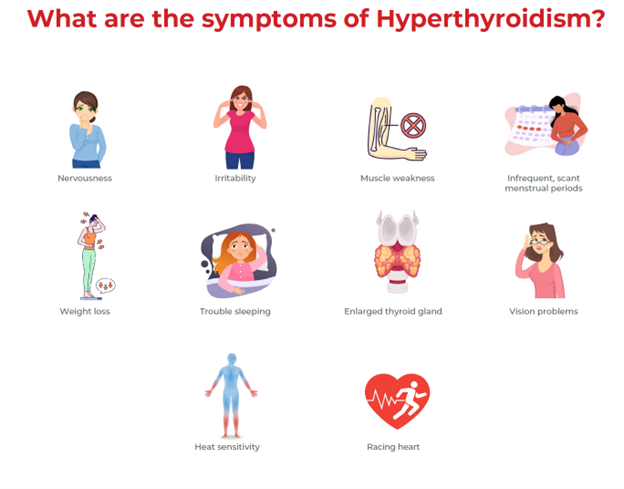
How is Thyroid disease diagnosed?
Early diagnosis and treatment of thyroid disease is crucial. Doctors may order one or more blood tests to check thyroid function.
1. TSH (Thyroid Stimulating Hormone)
This test measures the amount of TSH (Thyroid-stimulating hormone) in the blood. TSH stimulates the thyroid and is produced by the anterior pituitary gland. This test is used to diagnose hypothyroidism, hyperthyroidism, screen newborns for hypothyroidism, and monitor treatment for thyroid disorders.
2. T4, Free
This test helps to evaluate thyroid gland function and diagnose thyroid disease including hypothyroidism and hyperthyroidism. Free T4 is also used to help diagnose congenital hypothyroidism in newborns.
Almost all of the T4 found in the blood is bound to protein. The rest is free (unbound) and is the biologically active form of the hormone. This test measures the amount of free T4 in the blood.
3. T3 Free and Total
It Helps to evaluate thyroid gland function and diagnose thyroid diseases including hyperthyroidism. It also helps to monitor the effectiveness of treatment of a thyroid disorder.
Almost all of the T3 found in the blood is bound to protein. The rest is free (unbound) and is the biologically active form of the hormone. This test measures the amount of free T3 and total T3 (bound plus unbound) in the blood.
4. Thyroid Antibodies
This test measures the level of thyroid antibodies in the blood and helps to diagnose and monitor autoimmune thyroid diseases and to distinguish these from other forms of thyroid disease.
Antibodies are proteins made by the immune system to fight foreign substances like viruses and bacteria. There are different types of thyroid antibodies.
Thyroid peroxidase (TPO) antibodies: These antibodies can be a sign of Hashimoto’s thyroiditis or Graves’ disease.
Thyroglobulin antibodies (Tg): These antibodies can also be a sign of both Graves’ disease and Hashimoto’s thyroiditis. Most people with Hashimoto’s thyroiditis have high levels of both Tg and TPO antibodies.
Thyroid-stimulating hormone receptor antibodies (TSHR): These antibodies can be a sign of Grave’s disease.
5. Thyroglobulin
This test measures the amount of thyroglobulin, a protein produced by the thyroid gland, in the blood. This test is used to monitor the treatment of thyroid cancer and to detect recurrence.
Non-Laboratory Tests
1. Thyroid scans
A specialised imaging procedure to diagnose thyroid gland abnormalities and evaluate thyroid function in different areas of the thyroid.
2. Ultrasound
An imaging scan that is used to examine the thyroid for abnormalities, including cysts, nodules, or tumors.
